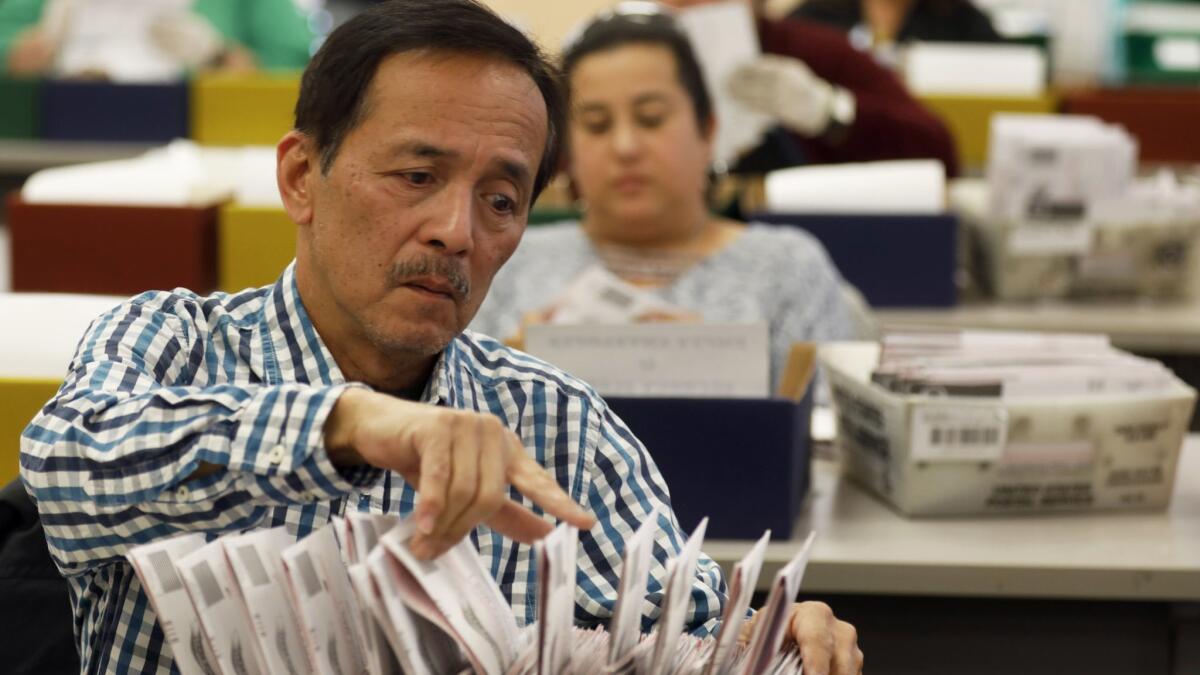Column: California’s campaign season goes extra innings when it comes to some unsigned absentee ballot envelopes

The section of California election law governing absentee ballots lays out a principle that grows more important every year: The rules “shall be liberally construed” in favor of the voter.
The idea, that government officials should generally err on the side of counting someone’s vote, is what motivated lawmakers to loosen the rules for tallying absentee ballots — almost 68% of all votes cast in the June primary.
First, the Legislature required ballots arriving in the mail three days after an election to be counted if postmarked by election day. In 2015, a provision was added giving voters extra time if they forget to sign their absentee ballot envelope. Otherwise, that ballot wasn’t counted.
California’s ballots are counted slowly, and that’s by design »
This rule has kept politicking in some of this election’s closest races going well past Nov. 6. The law says an election official can’t reject the ballot if the voter provides a signature by the close of business “on the eighth day after the election.”
But what about after that? Can an elections office accept an absentee ballot signature after the eighth day? Last week, Secretary of State Alex Padilla’s office sent county registrars an advice memo that says, in essence, to remember the rules should be “liberally construed.”
“In the absence of a direct mandate to reject a vote-by-mail ballot if submitted after 5 p.m. on the eighth day after the election ... our recommendation is for a county elections official to accept an Unsigned Ballot Statement up to the point in time where it would interfere with the duties of completing the county’s official canvass,” wrote Steve Reyes, Padilla’s chief counsel. The phrase “the point in time where it would interfere” is, as you might expect, not defined.
On Thursday, the campaign manager for a Republican Assembly candidate in Orange County asked the California Supreme Court to intervene. The filing states that some registrars have decided to accept the absentee signature fixes from voters as late as Dec. 1, and argues that the 2015 law “is clear and unambiguous” in setting a Nov. 14 deadline.
That later deadline has candidates in some razor-thin races scrambling to get those absentee ballot mistakes fixed — and with strong Democratic turnout in this election, those votes could tip even more races into the party’s column.
If you’re wondering how the campaigns know which voters’ ballots had a signature problem, it’s because county elections officials gave them a list. Here too the secretary of state’s office offered guidance: “If your office has created such a list of voters, our office has not identified any statute in either the Elections Code or the Government Code that would prohibit the release of this information,” Reyes wrote in a Nov. 9 memo.
That same day, the Democratic Congressional Campaign Committee, which has been deeply involved in pushing several Democrats over the top against Republican House candidates, asked an Orange County judge to force the local registrar to hand over the list. Some of the close to 2,000 names were released by a temporary ruling, but last Wednesday the judge changed course and denied the release of any additional voter information.
Los Angeles County, which had about 3,900 absentee error ballots in its first report, was one of the counties that did provide voter names to campaigns. Elections officials in other counties have viewed campaign contact after Nov. 6 as off limits.
Part of the confusion may lie in a separate state law governing mismatched signatures, one that explicitly allows voters more time to make fixes. Still, the practical lesson from all of this is that candidates may want a fast result in an election, but they’ll work any available options to ensure that every last vote is counted.
Follow @johnmyers on Twitter, sign up for our daily Essential Politics newsletter and listen to the weekly California Politics Podcast
More to Read
Get the L.A. Times Politics newsletter
Deeply reported insights into legislation, politics and policy from Sacramento, Washington and beyond. In your inbox three times per week.
You may occasionally receive promotional content from the Los Angeles Times.











